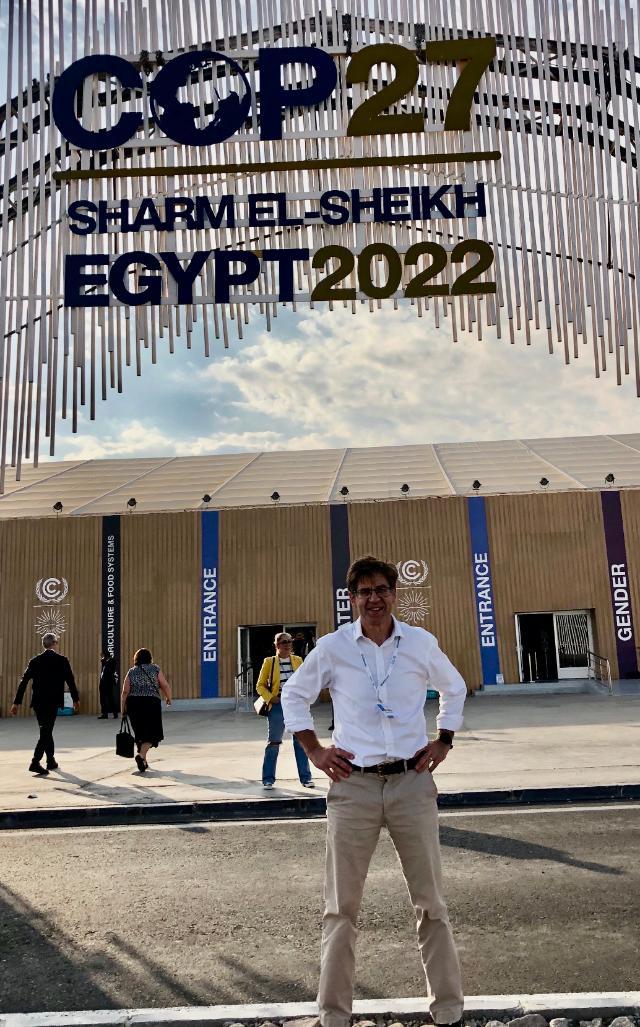Reflections on COP27
Wolfson Institute of Population Health Professor of Primary Care Christopher Griffiths reflects on his experience at COP27.

I’m writing on the last day of COP27. I’ve been privileged to be here on behalf of QMUL. What have I learned?
Firstly, it's easy to criticise COP27 as an indulgence with a large carbon footprint, but there is enormous energy here.
COP27 is a catalyst – an annual global meeting place to generate better and faster ways to avoid climate meltdown. COP27 fosters ‘ambition loops’, where people challenge each other to set increasingly more ambitious targets. The climate crisis won’t be solved by people working in silos, scattered across the globe; it’s problems need creativity mixed with an intersectional, multidisciplinary approach: expertise in finance, science, technology, engineering, oceanography, architecture, behaviour change and more, co-created with people from all ages and countries. One solution may not fit all localities or communities. Also, these discussions can’t happen by Zoom alone; face-to-face meetings are vital to form new alliances and allegiances and create new ideas and challenge narrow thinking. Meetings here at COP27 included allowing eclectic and diverse people to join by Zoom, enabling the conference to make the best use of technology to bring people together in real time.
Secondly, Climate Justice underpins everything. I mentioned previously my chance meeting with a group of parliamentarians from African states, who said they were determined to invest in, extract and continue to use fossil fuels, and couldn’t move to renewables until debt was cancelled and developed nations provided the technology they needed. Why should they not benefit from their fossil fuels, as developed nations had?
Feeling gloomy, I asked UNFCCC’s Climate Champion Nigel Topping about my encounter. He said these views were not representative of most African States. The following day I heard the lead for Burkina Faso declare her country is switching to renewables as fast as possible - they were ‘open for business’. Can we really expect developing nations to cease fossil fuel extraction when our own government is pursuing precisely this path?
Thirdly, you see, feel and hear the weight of passionate opinion – the striking statement at the Pakistan pavilion demanding action after devastating floods “What goes on in Pakistan won’t stay in Pakistan”; young people demonstrating and contributing to debates; and people from indigenous groups everywhere proudly representing their cultural heritage and identity dressed in unique traditional outfits. When Brazilian President-elect Luiz Inácio Lula da Silva arrived, Amazonian indigenous groups erupted, chanting and dancing around the Centre.
I came to COP27 thinking that air pollution was under-emphasised as a lever for climate change. But I heard Rosamund Kisi Debra (whose daughter Ella, died from traffic-related air pollution (TRAP) exposure in London argue powerfully for the adoption of the ambitious new World Health Organization limit values for air pollutants, both for health benefit and to combat climate change. Moreover, she argued that the effects of air pollution disproportionately harm women through impacts on pregnancy and childhood - especially those from disadvantaged areas and minoritised ethnic groups, further disadvantaging them and widening health inequalities.
After a panel discussion, where the UK’s Transport Minister seemed very happy with the UK’s targets and progress on decarbonisation, I challenged him on the slow roll out of Electric Vehicle (EV) charging points - people won’t buy EVs because they can’t easily charge them and travel useful distances. In a triumph of peculiar logic, he said his department won’t roll out charging points quickly as the technology will change. Where is the urgency? This Chicken and Egg thinking is beyond frustrating, as exposure to air pollution in cities is creating a generation of children with stunted lung and brain development.
Indeed, toxic air in cities is a global problem, and rapid urbanisation is making it worse. Action is needed, especially in developing mega cities, many of which have minimal or no measurement of air quality. Imagine you are the mayor of Dhaka, responsible for a population of 30 million which increases by 2,000 every day. Yes, there are fantastic initiatives – we heard about the Cityzens4CleanAir (https://urbanbetter.science/cityzens-for-clean-air/) project an amazing citizen science project, led by children in Lagos, Accra and Cape Town, with Professor Tollulah Oni; in which adolescents participating in the project run across their cities wearing air pollution monitors, then analyse their real-time data, and give their opinion on camera regarding what their solutions were to air pollution in their cities. There are few more powerful voices for change than those of children and young people living in these polluted environments.
But the crux of COP27 is the final ‘cover statement’. By the time you read this we’ll know whether the target of last year’s Glasgow Climate Pact target of 1.5 degrees is retained, whether a loss and damage will be created, and whether a statement agreeing the phase out of all fossil fuels is accepted. A hat-trick of achievements would be an impressive outcome. We shall see. The world is watching.